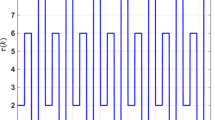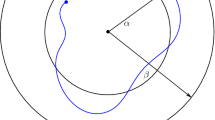Abstract
In order to extend the existing fixed-time control robustness results for double-integrator systems to general nonlinear systems, the fixed-time input-to-state stability (FT-ISS) of a class of nonlinear system with bounded exogenous disturbances is studied through generalized homogeneous approximations in this paper. To this end, the definitions of finite-time and fixed-time class \({\cal K}{\cal L}\) functions are given. Based on the definitions, the sufficient conditions of the FT-ISS property with respect to exogenous disturbances are proposed. Then, a class of fixed-time filters is designed under the principle of generalized homogeneous approximations. As a particular example, the stability and frequency characteristics of the low-pass fixed-time filter are analyzed by the presented sufficient conditions and describing function method, respectively. Finally, a simulation example is presented to illustrate the efficiency of the fixed-time filter.
Similar content being viewed by others
References
B. Tian, Z. Zuo, X. Yan, and H. Wang, “A fixed-time output feedback control scheme for double integrator systems,” Automatica, vol. 80, pp. 17–24, 2017.
S. P. Bhat and D. S. Bernstein, “Finite-time stability of continuous autonomous systems,” SIAM Journal on Control and Optimization, vol. 38, no. 3, pp. 751–766, 2000.
Y. Shen and Y. Huang, “Global finite-time stabilisation for a class of nonlinear systems,” International Journal of Systems Science, vol. 43, no. 1, pp. 73–78, 2012.
Y. Hong, J. Huang, and Y. Xu, “On an output feedback finite-time stabilization problem,” IEEE Transactions on Automatic Control, vol. 46, no. 2, pp. 305–309, 2001.
Y. Hong, J. Wang, and D. Cheng, “Adaptive finite-time control of nonlinear systems with parametric uncertainty,” IEEE Transactions on Automatic Control, vol. 51, no. 5, pp. 858–862, 2006.
Q. Hui, W. M. Haddad, and S. P. Bhat, “Finite-time semistability and consensus for nonlinear dynamical networks,” IEEE Transactions on Automatic Control, vol. 53, no. 8, pp. 1887–1900, 2008.
C. Qian and J. Li, “Global finite-time stabilization by output feedback for planar systems without observable linearization,” IEEE Transactions on Automatic Control, vol. 50, no. 8, pp. 885–890, 2005.
Y. Liu, X. Liu, Y. **g, H. Wang, and X. Li, “Annular domain finite-time connective control for large-scale systems with expanding construction,” IEEE Transactions on Systems, Man, and Cybernetics: Systems, vol. 51, no. 10, pp. 6159–6169, 2020.
Y. Shen and X. **a, “Semi-global finite-time observers for nonlinear systems,” Automatica, vol. 44, no. 12, pp. 3152–3156, 2008.
X. Wang and H. Lin, “Design and frequency analysis of continuous finite-time-convergent differentiator. Aerospace Science and Technology,” Aerospace Science and Technology, vol. 18, no. 1, pp. 69–78, 2012.
R. Engel and G. Kreisselmeier, “A continuous-time observer which converges in finite time,” IEEE Transactions on Automatic Control, vol. 47, no. 7, pp. 1202–1204, 2002.
T. Menard, E. Moulay, and W. Perruquetti, “A global high-gain finite-time observer,” IEEE Transactions on Automatic Control, vol. 55, no. 6, pp. 1500–1506, 2010.
X. Wang, Z. Chen, and G. Yang, “Finite-time-convergent differentiator based on singular perturbation technique,” IEEE Transactions on Automatic Control, vol. 52, no. 9, pp. 1731–1737, 2007.
S. P. Bhat and D. S. Bernstein, “Finite-time stability of homogeneous systems,” Proc. of the American Control Conference, pp. 2513–2514, 1997.
V. T. Haimo, “Finite time controllers,” SIAM Journal on Control and Optimization, vol. 24, no. 4, pp. 760–770, 1986.
A. Isidori, S. Sastry, P. Kototovic, and C. Byrnes, “Singularly perturbed zero dynamics of nonlinear systems,” IEEE Transactions on Automatic Control, vol. 37, no. 10, pp. 1625–1631, 1992.
J. I. Lee and I. J. Ha, “A novel approach to control of nonminimum-phase nonlinear systems,” IEEE Transactions on Automatic Control, vol. 47, no. 9, pp. 1480–1486, 2002.
H. K. Khalil, Nonlinear Systems, 3rd ed., Prentice Hall, Upper Saddle River, New Jersey, 2002.
P. V. Kokotovic, H. K. Khalil, and J. O. Reilly, Singular Perturbation Methods in Control: Analysis and Design, Academic, New York, 1998.
A. Saberi and H. K. Khalil, “Quadratic-type Lyapunov functions for singularly perturbed systems,” IEEE Transactions on Automatic Control, vol. 29, no. 6, pp. 542–550, 1984.
P. Zarchan, Tactical and Strategic Missile Guidance, 5th ed., American Institute of Aeronautics and Astronautics, Reston, Virginia, 2007.
Y. Liu, D. Yao, L. Wang, and S. Lu, “Distributed adaptive fixed-time robust platoon control for fully heterogeneous vehicles,” IEEE Transactions on Systems, Man, and Cybernetics: Systems, 2022.
Y. Song, Y. Wang, J. Holloway, and M. Krstic, “Time-varying feedback for regulation of normal-form nonlinear systems in prescribed finite time,” Automatica, vol. 83, pp. 243–251, 2017.
A. N. Nekhoroshikh, D. Efimov, E. Fridman, W. Perruquetti, I. B. Furtat, and A. Polyakov, “Practical fixed-time ISS of neutral time-delay systems with application to stabilization by using delays,” Automatica, vol. 143, 110455, 2022.
S. Battilotti, “Stabilization via generalized homogeneous approximations,” IEEE Transactions on Automatic Control, vol. 62, no. 7, pp. 3510–3517, 2017.
C. Qian, “A homogeneous domination approach for global output feedback stabilization of a class of nonlinear systems,” Proc. of the American Control Conference, pp. 4708–4715, 2005.
C. Qian and W. Lin, “Recursive observer design, homogeneous approximation, and nonsmooth output feedback stabilization of nonlinear systems,” IEEE Transactions on Automatic Control, vol.51, no. 9, pp. 1457–1471, 2006.
C. Zhang, C. Qian, and S. Li, “Generalized homogeneity with monotone degree and smooth stabilization for a class of feedforward systems,” Proc. of IEEE Conference on Decision and Control (CDC), pp. 308–313, 2012.
C. Zhang, C. Qian, and S. Li, “Global smooth stabilization of a class of feedforward systems under the framework of generalized homogeneity with monotone degrees,” Journal of the Franklin Institute, vol. 350, no. 10, pp. 3149–3167, 2013.
A. Polyakov, D. Efimov, and X. **, “Consistent discretization of a homogeneous finite-time control for a double integrator,” Proc. of IEEE Conference on Decision and Control, 2022.
A. Polyakov, D. Efimov, and X. **, “Consistent discretization of finite/fixed-time controllers,” ar**v preprint ar**v:2207.03235, 2022.
A. Polyakov and M. Krstićc, “Finite-and fixed-time nonovershooting stabilizers and safety filters by homogeneous feedback,” ar**v preprint ar**v:2202.07717, 2022.
K. Zimenko, A. Polyakov, D. Efimov, and A. Kremlev, “Homogeneity based finite/fixed-time observers for linear MIMO systems,” International Journal of Robust and Nonlinear Control, 2022. DOI: https://doi.org/10.1002/rnc.6284
V. Andrieu, L. Praly, and A. Astolfi, “Homogeneous approximation, recursive observer design, and output feedback,” SIAM Journal on Control and Optimization, vol. 47, no. 4, pp. 1814–1850, 2008.
L. Wang, S. Chen, and K. Ma, “On stability and application of extremum seeking control without steady-state oscillation,” Automatica, vol. 68, pp. 18–26, 2016.
Author information
Authors and Affiliations
Corresponding author
Ethics declarations
The authors ensure that there is no potential conflict of interest possibly influencing the interpretation of data in the paper. The authors declare that there is no competing financial interest or personal relationship that could have appeared to influence the work reported in this paper.
Additional information
Publisher’s Note Springer Nature remains neutral with regard to jurisdictional claims in published maps and institutional affiliations.
This work was supported by the China Postdoctoral Science Foundation (Grant No. 2021M692784), the National Natural Science Foundation of China (Grant No. 52005436, 51975519), and the Zhejiang Provincial Program for High-Level Talents(Grant No. 2021R52038).
Libin Wang received his B.S. degree in control science and engineering from Hebei University of Technology in 2012, his M.S. and Ph.D. degrees in control science and engineering from Harbin Institute of Technology (HIT) in 2014 and 2020. From 2016 to 2018, he was a visiting Ph.D. student in Mechanical and Aerospace Engineering, University of California, San Diego, CA, US. He is currently with the School of Mechanical Engineering, Zhejiang University, Hangzhou, China. His research interests include extremum seeking, adaptive control, and intelligent test method of aircraft airborne system.
Changxi Deng received his B.S. degree in mechanical design and manufacturing from Jiamusi University, Jiamusi, China, in 2006 and an M.S. degree in mechanical engineering from Zhejiang University, Hangzhou, China, in 2015. He is a Professorate Senior Engineer with AVIC **’an Aircraft Industry Group Company LTD. He is mainly engaged in the application research of intelligent control technology in the field of aviation manufacturing.
Zemin Pan was born in Ningbo, China, in 1987. He received his B.S. and Ph.D. degrees from the Department of Mechanical Manufacture and Automation, Zhejiang University, Hangzhou, China, in 2016. He has been working at NingboTech University since 2016 and is currently an Associate Professor. His research interests include aircraft digital assembly system and control technique, motion control and adaptive control of electromechanical systems.
Qiang Fang was born in Shaoxing, China, in 1975. He received his B.S., M.S., and Ph.D. degrees from Harbin Institute of Technology, Harbin, China, in 2006. He worked as a Postdoctoral Researcher at Zhejiang University, Hangzhou, China, in 2006, where he is currently a Professor. His research interests include aircraft digital assembly system and control technique, motion control, and robust control. He has published more than 30 papers in the International Journal of Modeling, Identification and Control, Chinese Journal of Mechanical Engineering, and Journal of Zhenjiang University (Engineering Science), etc.
Rights and permissions
About this article
Cite this article
Wang, L., Deng, C., Pan, Z. et al. Fixed-time Input-to-state Stability via Generalized Homogeneous Approximations. Int. J. Control Autom. Syst. 22, 116–126 (2024). https://doi.org/10.1007/s12555-022-0719-y
Received:
Revised:
Accepted:
Published:
Issue Date:
DOI: https://doi.org/10.1007/s12555-022-0719-y




